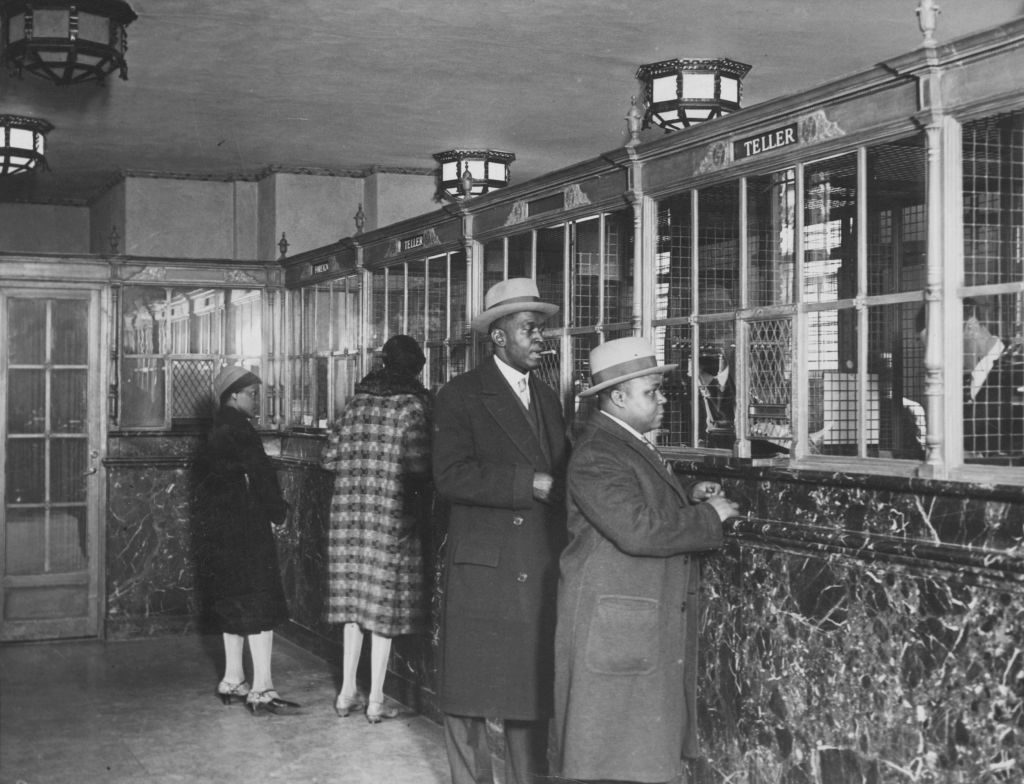Black-Owned Banks, Fintech: Community Reinvestment Potential
Black-Owned Banks: How Fintech Presents Untapped Community Reinvestment Potential

Customers wait in line at the Dunbar National Bank in Harlem, owned by and for African-Americans, on January 7, 1933. | Source: Keystone / Getty
The 2011 Durbin Amendment to the Dodd-Frank Wall Street Reform and Consumer Protection Act directed the Federal Reserve Board to limit debit card processing fees charged by large financial institutions. However, some players exploit this consumer-oriented provision to cushion their bottom lines.
The financial technology sector, or fintech, permeates most everyday facets of life, from splitting a dinner tab using Venmo or using your bank’s mobile app to paying for your movie ticket with a tap of your phone and tipping your Uber driver with a stored credit card.
Framed by Forbes as the catch-all term for technology used to “augment, streamline, digitize or disrupt” traditional financial services, the fast-growing fintech sector remains largely unregulated, and its interchange fee structure has made investors in money-sharing apps such as Venmo and Zelle rich.
Now, consider Hindenburg Research’s recent swipe at Jake Dorsey’s newest venture, Block, asserting that roughly one-third of revenue for Block’s popular Cash App tool flows from opaque “interchange fees.”
“Congress passed a law that legally caps ‘interchange fees’ charged by large banks that have over $10 billion in assets. Despite having $31 billion in assets, Block avoids these regulations by routing payments through a small bank and gouging merchants with elevated fees,” the Hindenburg report stated.
Dorsey’s Block claims to serve the “unbanked“ and “underbanked,” or those people whose weak or nonexistent credit histories keep them at arm’s length from traditional banking services. However, his tactics avoid the federal limits and charge unnecessary fees that are passed along to consumers, which begs the question, “Who is truly being ‘served’?”
While the financial sector grapples with the best way to equitably regulate the “Wild West” banking climate, minority depository institutions and other small financial institutions have an opportunity to provide a stable and growing revenue vehicle for community reinvestment.
It is possible to be both mission-driven and profitable as a financial institution, and during the pandemic, we witnessed it. It was the small to mid-sized banks and credit unions that came to the rescue, approving almost 20% of Paycheck Protection Program (PPP) dollars for small business owners during the first round of funding. These financial institutions are on the ground and are vested in helping business owners in their community thrive.
Balancing financial lending with a servant’s heart is not a simple task, but properly leveraged fintech tools provide a way to do exactly that. Students of the emerging model can easily see that smaller community and Black-owned banks are uniquely positioned to restore the public’s trust in banking institutions.
Ashley D. Bell is a Georgia-based corporate finance attorney, political adviser and founder and CEO of Ready Life, a fintech startup pioneering a new path to homeownership without credit scores.
SEE ALSO:
Killer Mike’s Digital Banking Platform Secures $40M In Funding
How Closing The Racial Wealth Gap Would Change Black History
















